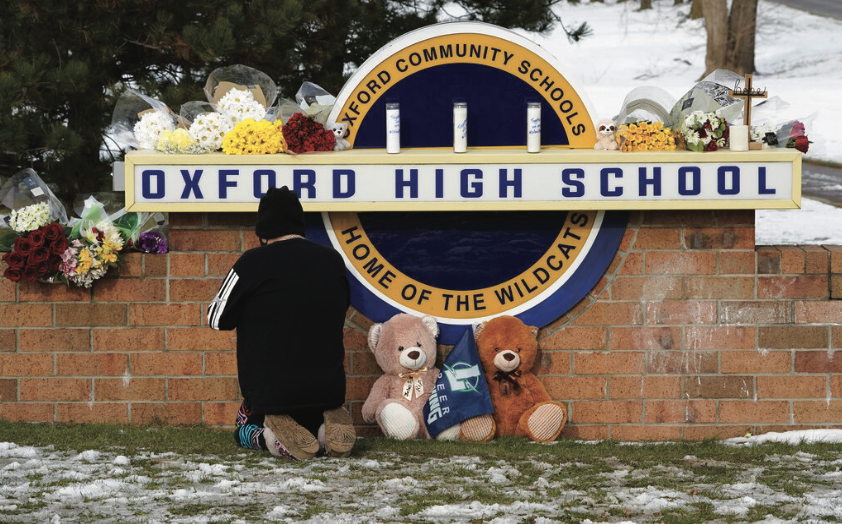Michigan shooting illustrates need for change
Though desensitized to mass shootings, we must continue addressing the issue
Many students might remember almost four years ago walking out in solidarity with the victims of the Stoneman Douglas High School shooting.
At New Trier, specifically, over 1000 students walked out a month after the tragic event, all demanding change in the country.
Yet, this wasn’t an event limited to larger high schools; the shootings happened while I was in middle school and I along with hundreds of students walked out for 17 minutes of silence, one minute for each victim killed in the shooting.
Nowadays, we don’t see this accountability for change after mass shootings. Although I’m not advocating for walking out for every school shooting, especially considering the fact that in 2021 there have been 144 incidents of gunfire on school grounds, it seems that our country has forgotten how abnormal these events are.
The Oxford High School shooting in Michigan that occurred on Nov. 30, in which four students were killed and seven others were injured, follows this trend.
We’ve gotten so used to these preventable tragedies that it no longer fazes us when they happen. We justifiably demand change, yet to no avail.
At most, news outlets print front page-worthy articles, people react for a few days, and debates spark up over gun control in our country. One quality is always the same: nothing gets done. Instead, political organizations exploit these incidents and the emotional stories of the victims behind them to farm votes and representation.
On one side, you have people aggressively campaigning for policies like providing teachers with guns to protect students. On the other, you have those advocating for absolute gun control. Usually, these types of ideas are implausible and unrealistic and don’t acknowledge the actual implications of mass shooting incidents.
For example, I rarely see movements pushing for an increase in adequate mental health resources and programs that not only destigmatize mental health, but try to acknowledge it and treat it among students from an early age.
Almost always, those behind the attacks on our schools show warning signs well before they
act. According to The Violence Project, 80% of mass shooters were in a noticeable crisis prior to their shooting.
In this most recent Oxford shooting, it’s no different. Days before the incident, teachers reported seeing the student search for ammunition online and even a note he wrote on his desk: “The thoughts won’t stop. Help me.” Had the student been provided with effective and accessible mental health resources within the school, the outcome could’ve been different.
Another issue I see that promotes these terrorists to perpetrate mass shootings is the attention they get in our country. Specifically, the glorification of the killer in the news and printing their name and image whenever an incident happens. That’s why I will not utter the name of the terrorist behind the shooting, but focus on the heroes and victims that inexcusably lost their lives.
The four people who lost their lives that day were 14-year-old Hana St. Juliana, 17-year-old Madisyn Baldwin, 17-year-old Justin Shilling, and 16-year-old Tate Myre. I also want to highlight about Myre–a hero who lost his life while trying to disarm the Oxford shooter.
I’m tired of people treating school shootings as some partisan issue. I’m tired of people underestimating the number of individuals lost to school shootings; one person killed in a school shooting is one too many. And I’m tired of the nonexistent change that happens after countless innocent people lose their lives.







































